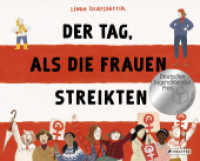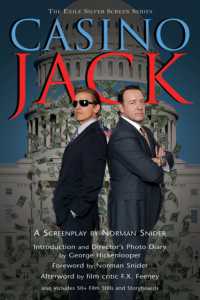- ホーム
- > 洋書
- > 英文書
- > Philosophy
Full Description
The first English-language translation of Vilém Flusser's final series of lectures: the definitive introduction to his methods and ideas in new media theory
In summer 1991, shortly before his death, Vilém Flusser gave a series of lectures as guest professor at Ruhr University Bochum at the invitation of Friedrich Kittler. Flusser intended for these lectures to be the definitive introduction to his "communicology," the study of human communication and the means by which acquired information is saved, processed, and passed on. In Thinking Further, Aaron Jaffe and Michael F. Miller have curated "fragments" from these lectures - first published in German in 2008 - to present the most exciting and timely parts of Flusser's foundational contributions to what is now known as media studies.
These fragments capture Flusser's engagements with a wide range of theories, approaches, and interventions, including ecocriticism, posthumanities, game theory, cybernetics, and translinguistic exchanges. Offering sustained engagements with the ideas of Walter Benjamin, Michel Foucault, Michel Serres, and Jean Baudrillard, Thinking Further models possibilities for thinking through and clarifying the most obscure and obdurate implications of technology and modernity.
As they demonstrate Flusser's contextual positionality and antiuniversalism, the writings presented here also underscore the pleasures and the power of his aphoristic style. Focusing less on Flusser-as-philosopher and more on his role as wry sage at the end of history, Thinking Further is a comprehensive but approachable introduction to his boundary-transcending exploration of the possibilities for communication, writing, and the human condition.
Retail e-book files for this title are screen-reader friendly.
Contents
Contents
Note on the Translation
Preface — Friedrich A. Kittler
Editorial Preface: Toward VilÉm Flusser's Bochum Lectures — Silvia Wagnermaier and Siegfried Zielinski
Inaugural Lecture: Before the Board of Trustees Motives/Motifs Natural and Human Sciences Communication Theory Lecture 1: On the Communicological Art of Definition Kultur/Kritik Processing: Dialogue
Transmitting: Discourse Saving Mythical: Oral Culture
Magical: Material Culture Standpoints Phenomenological
Informatical
Scientific-Critical Cultural Revolutions From Work to Waste
After the Communication Revolution: Bundling versus Networking Lecture 2: Of Spaces and Order Publicizing I
Publicizing III Virtual Space
Alternate Worlds Calculable Freedom, Intersubjective Creativity
Proxemics
Responsibility Lecture 3: Abstractions and Feedback Numerical Code From Culling to Counting Arithmetic
Geometry Antirationalism: Intuition and Nazism Programming Lecture 4: On Science, Art, Politics, and Technology On the Decline of the Aura and the Death of the Author Work II: Soft and Hard
The Practice of Writing
From Homo universale to Teamwork
The Unemployed as Avant-Garde
The End of Politics I Lecture 5. On the Death of Images and the End of History Video: Instant Philosophy Mirrors: Reflection and Speculation
Bundling Instead of Networking—At the End of All Structures
Networking Games and Art Spiele, Jogos, Games Lecture 6: About Chance and the Freedom to Play with and against It Coincidence
On Freedom I: Refraining From
On Freedom II: Anticipating
Concerning Lost Freedom I: Sin
Concerning Lost Freedom II: Technics and Will
Concerning Lost Freedom III: To Accept Lecture 7: On Leisure Unemployment and Interface On the Suffix "-matic"
On the Prefix "Tele-" Pathos Epilogue: Flusser's Planet — Aaron Jaffe and Michael F. Miller
Notes








